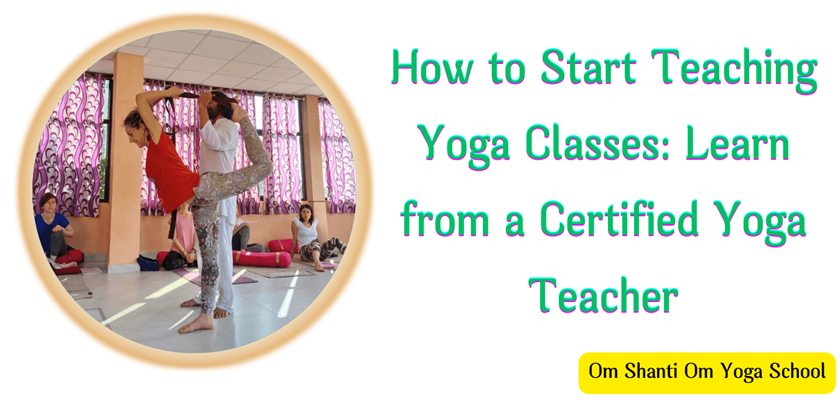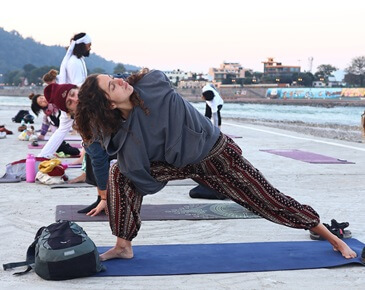
27 March. 2024
How to Start Teaching Yoga Classes: Learn from a Certified Yoga Teacher
Embarking on the journey of teaching yoga is both rewarding and fulfilling. As a certified yoga teacher myself, I understand the excitement and apprehension that comes with starting this path. In this guide, I'll walk you through the essential steps to kickstart your career as a yoga instructor, drawing from my own experiences and insights gained from teaching yoga. Whether you're newly certified or considering becoming a yoga teacher, this comprehensive guide will provide you with valuable advice and tips to help you thrive in your teaching journey.
Refine Your Practice:
Before stepping into the role of a yoga teacher, it's crucial to refine your own practice. Dedicate time to deepen your understanding of yoga asanas, pranayama, meditation, and yoga philosophy. Regularly attend classes led by experienced instructors, explore various yoga styles, and continue your education through workshops and trainings. Cultivating a strong personal practice will not only enhance your skills but also inspire confidence as you begin teaching others.
Choose Your Yoga Style:
Determine the style(s) of yoga you're passionate about teaching. Whether it's Hatha, Vinyasa, Ashtanga, Yin, or Kundalini, each style offers unique benefits and appeals to different practitioners. Consider your own strengths, preferences, and areas of expertise when selecting a yoga style to specialize in. Additionally, be open to exploring and integrating elements from different styles into your teaching repertoire to cater to diverse student needs.
Gain Teaching Experience:
Gain teaching experience by offering classes to friends, family, or colleagues, or by volunteering to assist experienced instructors at yoga studios or community centers. Teaching practice sessions will help you refine your cueing, sequencing, and teaching skills while receiving valuable feedback from students and mentors. Additionally, consider leading donation-based or by-donation classes to make yoga accessible to a wider audience while honing your teaching abilities.
Obtain Yoga Teacher Certification:
Pursue formal yoga teacher training and obtain certification from a reputable yoga school or training program. Choose a program that aligns with your interests, schedule, and budget, and ensure it meets the Yoga Alliance standards if you wish to register as a Registered Yoga Teacher (RYT). A comprehensive teacher training program typically covers anatomy, physiology, teaching methodology, yoga philosophy, and practicum hours. Immerse yourself fully in the training experience, absorb knowledge from experienced teachers, and embrace the transformative journey of becoming a yoga instructor.
Create Your Teaching Brand:
Establish your teaching brand by defining your teaching style, values, and mission. Develop a compelling yoga teacher bio and create a professional teaching resume highlighting your qualifications, training, and teaching experience. Design a logo and branding materials that reflect your unique identity as a yoga teacher. Consider creating a website or social media profiles to showcase your offerings, share inspirational content, and connect with potential students. Cultivate a strong online presence to expand your reach and attract students to your classes.
Find Teaching Opportunities:
Explore various avenues to find teaching opportunities in your local community and beyond. Reach out to yoga studios, fitness centers, wellness retreats, corporate offices, schools, and community centers to inquire about teaching opportunities. Network with fellow yoga teachers, studio owners, and wellness professionals to build connections and discover potential collaborations. Offer to sub for other teachers, lead workshops or events, and explore online teaching platforms to diversify your teaching portfolio and reach a wider audience.
Cultivate Authentic Connections:
Cultivate authentic connections with your students by creating a welcoming and inclusive environment in your classes. Greet students with warmth and sincerity, learn their names, and take the time to listen to their needs and concerns. Offer modifications, adjustments, and personalized guidance to support students of all levels and abilities. Foster a sense of community by organizing social gatherings, workshops, or retreats where students can connect with each other and deepen their yoga practice beyond the mat.
Continue Your Education:
Commit to lifelong learning and continuous growth as a yoga teacher by pursuing advanced trainings, workshops, and retreats. Deepen your knowledge in specialized areas such as yoga therapy, prenatal yoga, trauma-informed yoga, or Ayurveda to expand your expertise and serve a broader range of students. Stay updated on the latest research, trends, and developments in the field of yoga and wellness. Invest in mentorship and professional development opportunities to refine your teaching skills and evolve as a compassionate and knowledgeable yoga instructor.
Practice Self-Care:
Prioritize self-care and well-being as you navigate the demands of teaching yoga. Maintain a regular self-care routine that includes yoga practice, meditation, mindfulness, and other holistic practices to nourish your body, mind, and spirit. Set boundaries around your teaching schedule to prevent burnout and maintain a healthy work-life balance. Seek support from fellow teachers, mentors, or mental health professionals if you experience stress, fatigue, or emotional challenges. Remember that self-care is not selfish but essential for sustaining your passion and presence as a yoga teacher.
Embrace Your Journey:
Embrace the journey of teaching yoga as a path of self-discovery, growth, and transformation. Celebrate your successes, learn from challenges, and stay open to the lessons that each teaching experience brings. Trust in your intuition, authenticity, and ability to inspire and empower others through the practice of yoga. Cultivate gratitude for the opportunity to share the gift of yoga with your students and contribute to their physical, mental, and spiritual well-being. Embrace the role of a lifelong student and teacher, and let your passion for yoga shine brightly in all that you do.
Starting a career as a yoga teacher is an enriching and empowering journey that requires dedication, passion, and a commitment to ongoing learning and growth. By refining your practice, gaining teaching experience, obtaining certification, creating your teaching brand, finding teaching opportunities, cultivating authentic connections, continuing your education, practicing self-care, and embracing your journey, you can embark on a fulfilling and rewarding path as a yoga instructor. Remember that teaching yoga is not just about leading asanas on the mat but also about inspiring transformation, fostering community, and spreading love and light in the world. May your teaching journey be guided by compassion, authenticity, and a deep reverence for the ancient wisdom of yoga. Namaste.


